|
|
|
Sort Order |
|
|
|
Items / Page
|
|
|
|
|
|
|
| Srl | Item |
| 1 |
ID:
133852
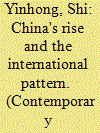

|
|
|
|
|
| Publication |
2014.
|
| Summary/Abstract |
Three basic elements stand out in the international pattern: global power distribution, the system of international norms and the transnational values systems, all of which are of vital importance in the interaction between China's rise and the future international pattern.
|
|
|
|
|
|
|
|
|
|
|
|
|
|
|
|
| 2 |
ID:
170775


|
|
|
|
|
| Summary/Abstract |
The Chinese People’s Liberation Army (PLA) anticipates that today’s advances in emerging technologies, particularly artificial intelligence, could catalyse a new military revolution. Elsa B Kania explores how, fearing surprise and seeking strategic opportunity, the PLA is actively pursuing military innovation and exploring new paradigms of military power.
|
|
|
|
|
|
|
|
|
|
|
|
|
|
|
|
| 3 |
ID:
187227


|
|
|
|
|
| Summary/Abstract |
The Military Revolution debate has dominated histories of early modern warfare for over sixty years. This essay searches for new analytical avenues by charting the nature, causes, and implications of variations in Mughal warfare in early modern South Asia. It argues that a range of factors—including environmental conditions, military pragmatism, financial considerations, and distance from the imperial heartland—caused Mughal war-making to become heterogeneous over time and across space and produced variations in strategy, tactics, and deployment of technologies. These variations affected the broader processes of Mughal war-making and empire-building. This line of investigation bears potential to influence the writing of comparative military histories and the study of early modern warfare while looking beyond the Military Revolution framework.
|
|
|
|
|
|
|
|
|
|
|
|
|
|
|
|
| 4 |
ID:
038490
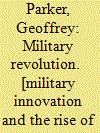

|
|
|
|
|
| Publication |
Cambridge, Cambridge Unversity Press, 1988.
|
| Description |
xviii, 234p.
|
| Standard Number |
0521326079
|
|
|
|
|
|
|
|
|
|
|
|
Copies: C:1/I:0,R:0,Q:0
Circulation
| Accession# | Call# | Current Location | Status | Policy | Location |
| 029506 | 355.0094/PAR 029506 | Main | On Shelf | General | |
|
|
|
|
| 5 |
ID:
006357
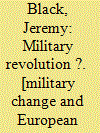

|
|
|
|
|
| Publication |
London, macmillan Press, 1991.
|
| Description |
xiii,109p.Pbk
|
| Series |
Studies in European History
|
| Standard Number |
033351906X
|
|
|
|
|
|
|
|
|
|
|
|
Copies: C:1/I:0,R:0,Q:0
Circulation
| Accession# | Call# | Current Location | Status | Policy | Location |
| 038060 | 940.2/BLA 038060 | Main | On Shelf | General | |
|
|
|
|
| 6 |
ID:
172260
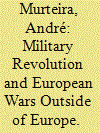

|
|
|
|
|
| Summary/Abstract |
This article discusses Portugal’s defeat in the Portuguese-Dutch war in Asia during the first quarter of the 17th Century, focusing on the much-debated issue of whether a military revolution in Europe produced a military exceptionalism that made Europeans militarily superior to non-Europeans in the Early Modern period. The view that Asian military influence on the Portuguese in the 16th Century made them militarily inferior to European enemies like the Dutch remains prevalent in Portuguese historiography. However, such influence appeared to occur only in certain areas of naval warfare, in a way that does not corroborate claims for an extensive Early Modern Western military exceptionalism.
|
|
|
|
|
|
|
|
|
|
|
|
|
|
|
|
| 7 |
ID:
175175
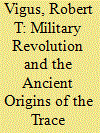

|
|
|
|
|
| Summary/Abstract |
The military revolution thesis posited by Michael Roberts and expanded on by Geoffrey Parker places the trace italienne style of fortification of the early modern period as a novel creation, born out of the minds of Renaissance geniuses. Research shows, however, that the trace italienne’s key component, the angled bastion, has its roots in Greek and Roman writings, and in extant constructions by Roman and Byzantine engineers. The angled bastion of the trace italienne was yet another aspect of the resurgent Greek and Roman culture characteristic of the Renaissance. The writings of the ancients were bolstered by physical examples located in important trading and pilgrimage routes.
|
|
|
|
|
|
|
|
|
|
|
|
|
|
|
|
| 8 |
ID:
066162
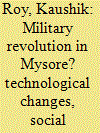

|
|
|
| 9 |
ID:
190871
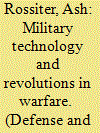

|
|
|
|
|
| Summary/Abstract |
The collection of essays in the special debate tackle the claim that drones deserve their acquired status as a revolutionary technology that has indelibly recast warfare. It is a debate embedded within a long-running and contentious, broader discussion about the role technology plays an independent variable affecting the character and perhaps the nature of war. How far can the introduction of a new technology really alter ways of fighting or radically impact battlefield outcomes? The complexity of the issue is reflected in the diversity of positions and approaches taken by the debaters. The purpose of these papers is not to arrive at a conclusion through a dialectic process; rather, readers are left to form their own views after weighing up the strengths of the arguments presented.
|
|
|
|
|
|
|
|
|
|
|
|
|
|
|
|
| 10 |
ID:
107793
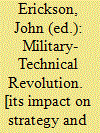

|
|
|
|
|
| Publication |
London, Pall Mall Press, 1966.
|
| Description |
284p.Hbk
|
|
|
|
|
|
|
|
|
|
|
|
Copies: C:1/I:0,R:0,Q:0
Circulation
| Accession# | Call# | Current Location | Status | Policy | Location |
| 001978 | 623.3/ERI 001978 | Main | On Shelf | General | |
|
|
|
|
| 11 |
ID:
133317
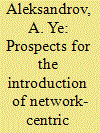

|
|
|
|
|
| Publication |
2014.
|
| Summary/Abstract |
the author looks at the prospects for the development of the network-centric warfare (operations) concepts and information technologies where they apply to the military. He also set out tentative areas of research to have the network-centric concept introduced into the Russia Armed Forces.
|
|
|
|
|
|
|
|
|
|
|
|
|
|
|
|
| 12 |
ID:
127891
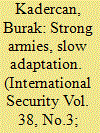

|
|
|
|
|
| Publication |
2013.
|
| Summary/Abstract |
Why are some states more willing to adopt military innovations than others? Why, for example, were the great powers of Europe able to successfully reform their military practices to better adapt to and participate in the so-called military revolution of the sixteenth and seventeenth centuries while their most important extra-European competitor, the Ottoman Empire, failed to do so? This puzzle is best explained by two factors: civil-military relations and historical timing. In the Ottoman Empire, the emergence of an institutionally strong and internally cohesive army during the early stages of state formation-in the late fourteenth century-equipped the military with substantial bargaining powers. In contrast, the great powers of Europe drew heavily on private providers of military power during the military revolution and developed similar armies only by the second half of the seventeenth century, limiting the bargaining leverage of European militaries over their rulers. In essence, the Ottoman standing army was able to block reform efforts that it believed challenged its parochial interests. Absent a similar institutional challenge, European rulers initiated military reforms and motivated officers and military entrepreneurs to participate in the ongoing military revolution.
|
|
|
|
|
|
|
|
|
|
|
|
|
|
|
|
| 13 |
ID:
133133
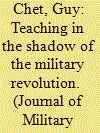

|
|
|
|
|
| Publication |
2014.
|
| Summary/Abstract |
In recent years, policy makers have noted that western armies in foreign lands l find themselves tasked with a new form of warfare. 'we'he novelty of twenty-f1rst Century warfare is usually traced to armies' non-combat tasks, such as civil and military engineering, economic development and security, crowd control, policing, community engagement, and public relations. Yet scholars of early modern are widely recognized these elements as central to the wars they examine, d thus not novel at all. Since specialists in the field examine armies engaged I dominantly in such non-combat activities, it is worth asking why similarities cen early modern and contemporary warfare are routinely overlooked. One _n is that despite rese-archers' increasing focus on the more mundane aspects strategy history, undergraduate classes retain the more traditional military history of battles and "Great Captains." In sections dealing with early modem ,for example, students get diplomacy, logistics, engineering, economics, social propaganda, and social control only in small doses, signifying to them that were less prevalent and less signi?cant than major battles in determining curse of wars and military affairs.
|
|
|
|
|
|
|
|
|
|
|
|
|
|
|
|
|
|
|
|
|